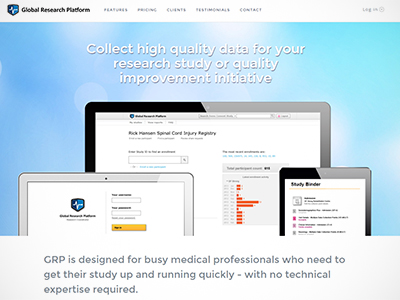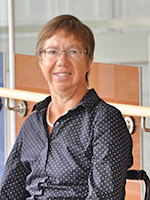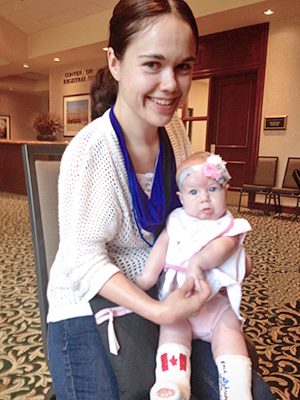
VCHRI scientist’s personal experience with a rare disease broadens perspective of research
When a disease is very rare, it’s hard for researchers to find enough patients to conduct meaningful studies. Vancouver Coastal Health Research Institute (VCHRI) research scientist Dr. Bonita Sawatzky is all too familiar with this challenge. Dr. Sawatzky studies people with arthrogryposis multiplex congenita (AMC), a rare condition that affects the development of nerves and muscles very early before these children are born, resulting in conditions such as clubfoot, stiff knee or hips and/or weakened arms. People with AMC often require multiple surgeries and therapy interventions.
“If I tried to study AMC patients in the Lower Mainland, I could only reach a handful,” says Dr. Sawatzky. “I only know of two adult patients, personally. So to get a larger sample size, I had to find a novel approach.”
Dr. Sawatzky used a powerful new tool funded by the Rick Hansen Institute. The Global Research Platform enabled her to post an online study that adults with AMC could complete.

“Because AMC is so rare, after the childhood diagnosis and treatment, very little tracking is done to see what happens in adulthood. We knew very little about how people manage with this condition as they go through life. There are no AMC-specific clinics that follow them.”
Dr. Sawatzky’s groundbreaking study discovered that contrary to expectations, people with AMC are leading very fulfilling lives.
“The outcome was remarkable. I was totally surprised at the data. People with AMC are doing really well despite having a significant disability and consistent pain. They just get on with life; that is their attitude.”
Survey respondents were three times more likely to have a graduate degree than able-bodied people, they were as likely to get married, and they had similar rates of employment. Dr. Sawatzky says they also scored very highly on emotional function testing, despite pain, surgeries and needing to use a wheelchair.

Dr. Sawatzky says her study results should give parents of newly diagnosed AMC babies great comfort.
“Being diagnosed with AMC is not a negative thing. The takeaway is that your child has a great chance of doing very well—treat them like normal kids. Support them when they need support, but don’t coddle them. Let them go for it!”
Sawatzky says the high level of education and accomplishment found in her survey respondents has led her to consider a new research project: imaging the brains of people with AMC to find out if they are different from individuals without the condition.
“We know that in the sub-category of amyoplasia that AMC individuals fall into, the cells in the spinal cord that control motor function somehow fail and shrink at about weeks eight to ten of fetal development. The question is, what happens to the stem cells still floating in the brain that don’t get the proper signal to attach to the motor cortex? Perhaps they connect to another part of the brain instead; one that controls problem solving and emotional function. This may account for the higher level of intellectual and emotional ability that we observe in AMC patients.”
A very personal connection to patient powered research
Dr. Sawatzky was initially reluctant to study AMC. She worried about objectivity. Why? She has the condition herself. For a long time, she felt she should not research her own condition. But she has discovered that having AMC has helped her do better research.
“We are moving from patient engagement in research to patients actually managing research studies. It is new territory and still a bit of an uncomfortable place for me. But who better to ask the right questions and have that connection to the population than someone who is part of it? There is such a warm response from patients when they know I am one of them. They cheer me on at conferences because they trust me and feel connected to me. It encourages me to make sure I do a good job!”

Dr. Sawatzky’s next step is to create an online registry of adults with AMC. This way she and her team can conduct a longitudinal study of people with AMC as they age and look at issues like mobility, what surgeries they still require and how they manage to work. For any rare disease research, Dr. Sawatzky says the online approach is the way of the future.


